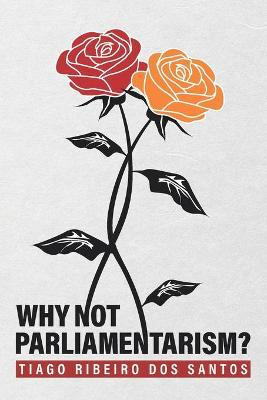Tiago Ribeiro dos Santos, Why Not Parliamentarism?


Tiago Ribeiro dos Santos, Why Not Parliamentarism? (Wordzworth, 2020)
In the mid-1980s, a draft of a paper by Yale comparative politics scholar Juan Linz on the preferability of parliamentary governments (where voters pick only legislators, who pick the prime minister themselves) to presidential governments (in which voters select their own heads of state) began to circulate among political scientists. Linz had been writing insightfully about the tendencies of various types of democracies to descend into authoritarianism since the 1960s, so it is natural that this distillation of his far-ranging thoughts on the subject of the perils related to governmental structure would attract significant attention. The paper focused on the additional flexibility afforded by parliamentary regimes, and on the dangers of the zero-sum, winner-take-all aspects of presidentialism. It also made much of the problems associated with the fixed and generally limited terms imposed by presidential systems, especially in places where democracy is new or fragile or the populace is extremely polarized.
It is not surprising that Linz’s paper was influential; it was born in an era where new democracies were emerging or disappearing almost daily, particularly in South America, so it was natural to want to understand why one system was apparently working while another wasn’t. It’s also no surprise that shortly after the article appeared, a stream of correctors and naysayers began to arrive. Some of the early responders were willing to concede the main thrust of Linz’s thesis; they simply thought he might have oversold it a bit. For example, in the view of two leading scholars, “Other things being equal, presidentialism tends to function better where presidencies have weak legislative powers, parties are at least moderately disciplined, and party systems are not highly fragmented….[W]e argue that switching from presidentialism to parliamentarism could exacerbate problems of governability in countries with undisciplined parties. Even if parliamentary government is more conducive to stable democracy, much rests on what kind of parliamentarism and presidentialism is implemented,” Mainwaring and Shugart, (1997)
Over time, one also began to see the No way! Our presidential government is the absolute best that could be created! response to Linz’s claims. Perhaps the paradigm example of that sort of jingoism was Steven Calabresi’s 2001 paeon, “The Virtues of Presidential Government” in which that republic-loving, libertarian author raised his voice to the heavens to ask this burning question: “Must we hang our heads in shame when we travel overseas, apologizing to all concerned for our untrendy system of separation of powers governance?” And he was quick to answer it: “No, a thousand times no!....Former enemies like Russia, Germany, and Japan are all now governed under Constitutions that owe much to American thinking.” Thus, Calabrese simply could not understand why anyone who really comprehends the magnificence of American constitutionalism would not be “joyful over our triumph in the war of ideas?”
Well, the ensuing years have shown that Linz’s work was not only penetrating for its day, and apt to non-U.S.-style structures, but incredibly prescient even with respect the old red, white, and blue. Calabrese’s bellicose bragging notwithstanding, nearly every warning that can be found in Linz’s short paper is now perfectly applicable to present-day America, where democracy of every type is teetering on the precipice. It is a good thing, therefore, to see the arrival of new books like Tiago Santos’ Why Not Parliamentarism, which revive many of Linz’s key theses. (The Steffen Ganghof and Brian Christopher Jones texts that have been subjects of earlier reviews here share many of these merits.)
Santos’s defense of parliamentary democracy is straightforward and empirical. He tells us that there are roughly the same number of parliamentary and presidential democracies around the world today, and then points out that the parliamentary varieties are routinely ranked much higher by presumably impartial organizations on such issues as GDP, life expectancy, sustainable development goals, press freedoms, and the “inequality-adjusted human development index.” And Santos points out, importantly, that it is not always the same parliamentary nations that are at the top of each ranking. So, for example, it may not just be (as one might expect) that the richest countries also have the freest media and population that lives the longest. Rather, it simply seems that on every list, presidential countries lag far behind their parliamentary peers—which ever ones they happen to be.
A canny political scientist, Santos is well-prepared for the objection that all he has found is a (perhaps meaningless) correlation between parliamentary structures and success in various areas. In fact, he anticipates any such objection: “Correlation may not be causation, but the existence of true correlation (in the sense that it is not just a coincidence) between A and B implies one of three things: either A causes B, B causes A, or some C causes both A and B….If there is indeed a correlation between parliamentary systems and good outcomes…then we are left with…[either] parliamentary systems foster good outcomes, good outcomes foster parliamentary systems, or something else fosters both.” The point of the book is to justify the claim that parliamentarism really is responsible for the goods.
Although I agree with him on that point, those familiar with my own almost entirely NON-empirical work on democratic theory will understand my hesitancy to endorse any methodology that focuses on the sorts of outcomes on which Santos’ methodology relies. I take it that what makes a democratic system good is that it supplies what the people there want, though I believe it must also be stable. I don’t mean to suggest that it is unreasonable to assume along with Santos that nearly everyone wants to live longer, or live in a richer country, or be a citizen in a country that is fostering sustainable development. But it also seems to me not unreasonable to believe that people around the world take many different positions on many different things and that they may change their minds/priorities frequently. That being the case, unless we are entirely comfortable with the accuracy and reach of retrospective polling, I think democratic theorists should be focused on ex-ante rather than ex-post system characteristics—other than stability, anyways. That is, we should be most interested in learning what sorts of voting schemes and governmental structures are expected to be best at getting their citizens—even those with goals we take to be cuckoo—what they want. On the other hand, I see no reason why those who are in essential agreement with the assessment of the items espoused by any of the various ranking organizations would not want to choose to live where, according to Santos’ acute analysis, there is likely to be a parliamentary government. I would simply warn that, unless one can make the case that the promised goods are intrinsic rather than instrumental (and I highly doubt they will be able to do that to MY satisfaction, at any rate), it is the ex-ante “getting what the people want” that should always remain the nub of arguments for this or that governmental structure.
Perhaps as a result of Santos’ relationship with Bryan Caplan, Jason Brennan, and the Economics Department at the University of Chicago, there is an epistocratic tinge to a significant portion of this book. I agree with the author’s compelling case that legislators are likely to do a better job than voters at achieving public policy goals and addressing prevailing problems: deliberation and compromise are unquestionably helpful activities and representatives tend to have a better sense both of what’s going on and what might be done about it. But whether we have a parliamentary or a presidential system, there will have to be voters voting, and if we are not talking about direct democracy or a government by initiative petition, I don’t think we need to worry very much about how voters would themselves handle pressing issues. Thus, what I think we should agree upon is that voters need to have frequent and fair opportunities to select the representatives they want (and, at least in my view, to recall them and to repeal legislation that has made these voters unhappy). The knowledge/ignorance level of the electorate is therefore orthogonal to the president versus prime minister debate, and I think Santos might have omitted this epistocratic (not to say elitist) material entirely. I will say, though, that while discussing this issue Santos makes the persuasive point that however voters may fare with respect to issue understanding, they seem to be very capable in the area of electing highly qualified representatives. And he adds the intriguing note that there may even be an evolutionary benefit associated with this talent.
If we now leave to one side both the material on outcomes—including that involving economic development within or outside municipalities run by council-appointed managers rather than elected mayors—and all the matter that disparages citizen intellectual capacities, and instead concentrate only on the sections of the book in which Santos discusses what he takes to be the intrinsic advantages of parliamentary over presidential systems, what will we find? First, Santos provides forceful new evidence in favor the increased stability of parliamentary regimes. In particular, he very capably resurrects Linzian stability claims after a generation of problematic criticism (notably by Cheibub). This important material alone seems to me a sufficient reason for picking up the book.
The discussion of the taxonomy of various hybrid structures is also quite illuminating. Santos is a very careful statistician and introduces numerous safeguards to prevent any chance that he is teeing off on structures that others might say are actually versions of parliamentarism or semi-parliamentarism. But he warns that getting lost in that thicket may be counterproductive in any case. In addition, the discussion regarding how to reasonably derive causal connections when one is confronted by a bunch of stable correlations is excellent. I especially enjoyed his rehearsal of the brilliant biologist Ronald Fisher’s failure to detect his own (smoker’s) bias when doing statistical analyses regarding causes of lung cancer. And Santos’ comparison of the risks of inaction on the government reform front with those of ignoring the connections between smoking and cancer makes for a thought-provoking appeal. Finally, his explanation of how a Bayesian would (and so, he believes, everyone SHOULD) look at the parliamentary/success correlations he develops is quite instructive. He reiterates here his thoughtful downgrade of the importance of precise, uniform definitions in favor of doing whatever we can to move forward on the democracy front based on reasonable, if not incorrigible, evidence and stipulative characterizations. He argues, quite convincingly, that one can be too fastidious about these matters even in the area of statistical testing. Sometimes we simply may not be able to determine the exact factors that are crucial to the production of particular outcomes. But, he believes, we must not be daunted by that failure: “For our purposes, it does not really matter what the single most important aspect of parliamentary systems is that makes them better; given how high the stakes are, countries would do well in adopting all of them.”
I confess to finding some of Santos’ concluding proposals regarding What We Should Do a bit confusing. Much of that space is taken up by his argument against any suggestion that the change to parliamentarism should progress via a Referendum (or what I would prefer to call an Initiative). He thinks “institutions” should somehow make this change rather than the voters themselves. This penchant seems to me partly to reflect the paternalistic attitude toward the intellectual prowess of the general citizenry mentioned above, but Santos also points out that it has been exceedingly rare for parliamentary structures to have appeared as a result of a plebiscite. He writes, in fact, that “Of all parliamentary countries in the world, I know of only one that held referenda on whether to have a presidential or parliamentary system: Bangladesh. Chile and Brazil, in turn, chose presidential over parliamentary systems. If it was illegitimate for parliament to assert their own supremacy without a popular vote, basically all parliamentary countries would have to be considered illegitimate.” And I suppose he might have added that since a central principle of parliamentary systems is that the legislature, rather than “the people,” is thought to be sovereign, the future parliament may as well just get started doing its thing without pretending to require any initial signal of approbation from the electorate. Indeed, he tells us that, “Given that the parliamentary countries are exactly the most consistently democratic, this [i.e., the illegitimacy of all parliamentary countries] cannot be true.”
Well, in my view, the key test of whether a public policy should be counted as the product of self-government (i.e., an instance of democracy) is whether the people got it because they wanted it. If one maintains a fear that this might never happen in the case of parliamentarism, then one is not really advocating for democracy but rather for certain other expected outcomes one happens to enjoy. And, of course, there may be more efficient ways to get THOSE. Santos notes, probably correctly, that “Democracy itself could have a hard time being chosen in a referendum against an authoritarian charismatic ruler” and adds that this argument could “be extended to just about any of the provisions of the UN Universal Declaration of Human Rights.” That may well be true, but as I have often repeated, if one does not exalt democracy—even over every so-called “human right” that is not itself inferable from the concept of authentic democracy—one should probably just advocate for a benign despot who will dole out those goods.
What, then, do I think we should conclude about the Linz/Santos claim that presidentialism and semi-presidentialism are inferior to parliamentarism (and, presumably, semi-parliamentarism as well?) In summary, I think we should agree that this assessment is probably correct. I’m not myself as moved as Santos is by high rankings on lists involving what seem to me largely capitalistic goals (whether I happen to share those goals myself or not), but I do think parliamentarism and semi-parliamentarism are likely to be preferable both to (i) any sort of presidentialism that is encumbered by the voluminous and anachronous “checks and balances” that bog down the U.S. system (and there are surely bound to be conflicts requiring such “checks” between independently elected centers of power); and (ii) autocratic versions of presidential systems, which are obviously not real democracies at all. This conclusion is contrary to the fact that, viewed in isolation, direct election of a head of state (a recallable and re-electable one, anyhow) is a more democratic process than a second-order selection of an executive by representatives. But as Linz explained and Santos elaborates, there are other crucial considerations involving flexibility, stability, deliberative opportunity, stress release, etc. Thus, I think that, overall, parliamentary systems are better, especially in countries where the party system is coherent, and (pace Brian Christopher Jones) where there is a decent written constitution in place.
That being said, it is also my view that the only move in that approximate direction that can be made both effectually and peacefully in countries having developed presidential systems is to try to institute provisions for Recall (not Impeachment!) and Referendum (not Initiative!). After all, it’s arguably the case that a majority of the American populace would currently support the recall of President Biden, and it’s surely the case that least a couple of years prior to Biden’s election a super-majority would have supported the recall of President Trump. So, it’s not crazy to think that such provisions could get enacted in the U.S. On the other hand, there is not a chance in hell that anything remotely resembling orthodox parliamentarism or semi-parliamentarism could be enacted here without a civil war. As I conceded in my review of Joshua Spivak’s book on the subject, getting recall terms right is no easy task, but I think giving it the old college try—as well as moving away from FPTP elections of representatives wherever we can—is the only sensible way to go, not only in the U.S., but anywhere there is a mature presidential system and a polarized electorate.
Tiago Santos responds here.

About the Author
Walter Horn is a philosopher of politics and epistemology.
His 3:16 interview is here.